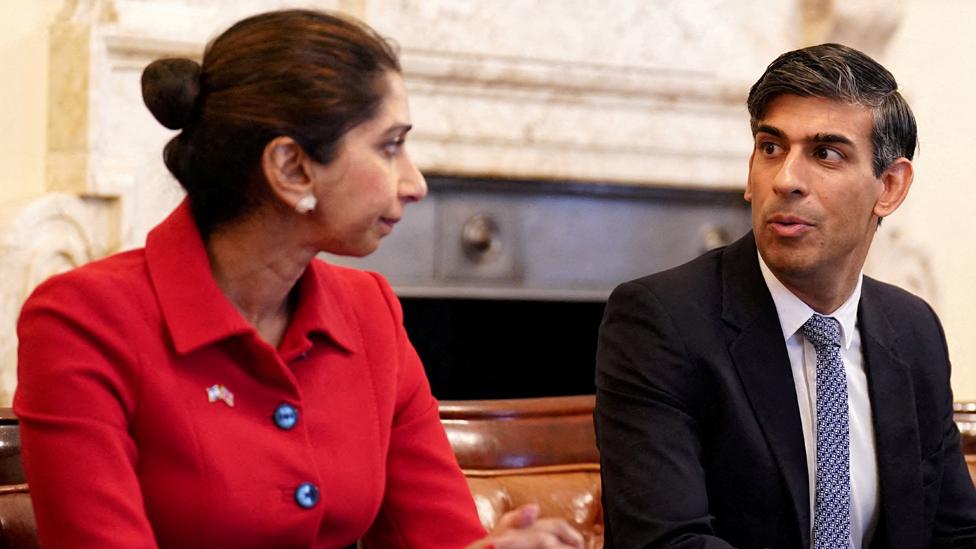Police brace for largest pro-Palestinian protest and impose Cenotaph exclusion zone
- Published
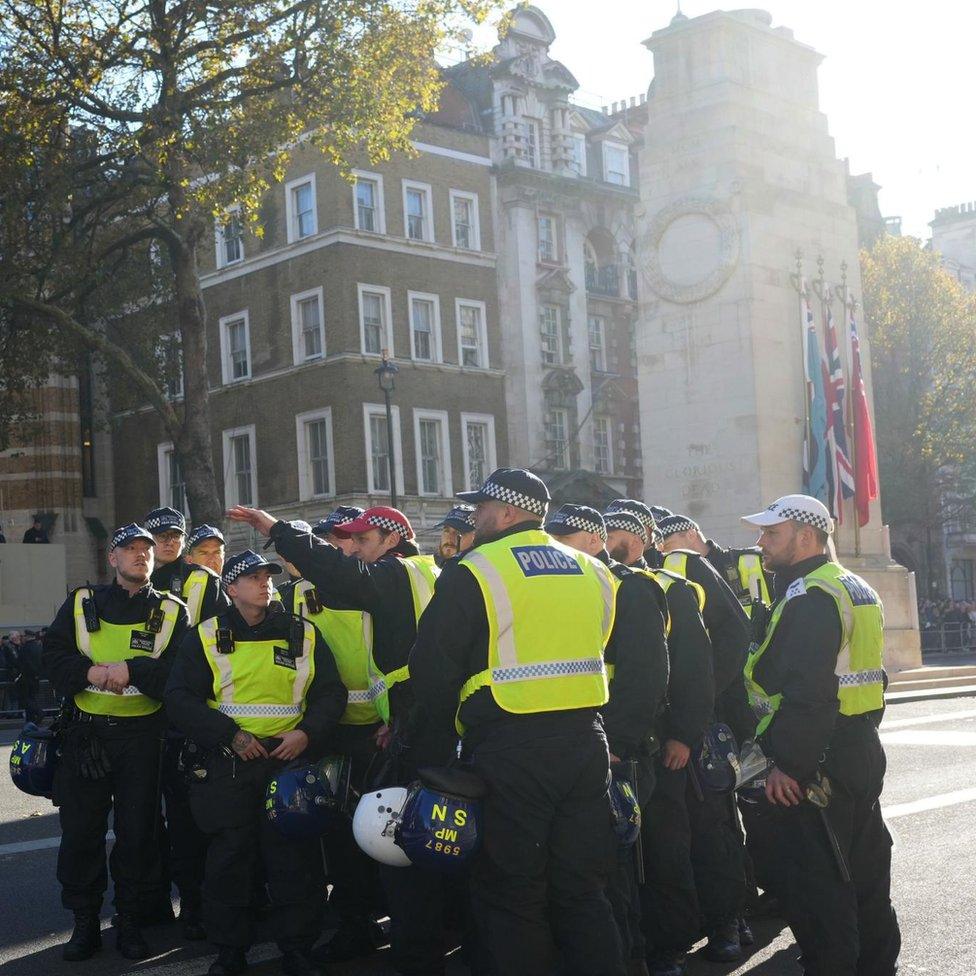
Police officers take their positions by the Cenotaph in Whitehall on Saturday morning
The Metropolitan Police says it is facing a challenging situation in London, as a large pro-Palestinian demonstration coincides with Armistice Day.
Hundreds of thousands of protesters are expected to take part in the march, to call for a ceasefire in Gaza.
Police say there is a risk of clashes with far-right groups, and have set up an exclusion zone around the Cenotaph.
The PM has called the timing of the pro-Palestinian march disrespectful.
Rishi Sunak also urged those taking part to do so calmly and with regard for those attending services to commemorate the end of World War One.
"It is because of those who fought for this country and for the freedom we cherish that those who wish to protest can do so, but they must do so respectfully and peacefully," Mr Sunak said.
"Remembrance weekend is sacred for us all and should be a moment of unity, of our shared British values and of solemn reflection."
The Met said officers faced some "aggression from counter-protesters who are in the area in significant numbers", ahead of a service at the Cenotaph war memorial where a two-minute silence was held.
The force said the two minutes' silence there was observed "respectfully". Officers are now tracking "different groups" moving away from Whitehall towards other parts of central London, the Met said.
Later, the King and Queen along with members of the Royal Family will attend the Festival of Remembrance at the Royal Albert Hall - ahead of the main service on Remembrance Sunday.
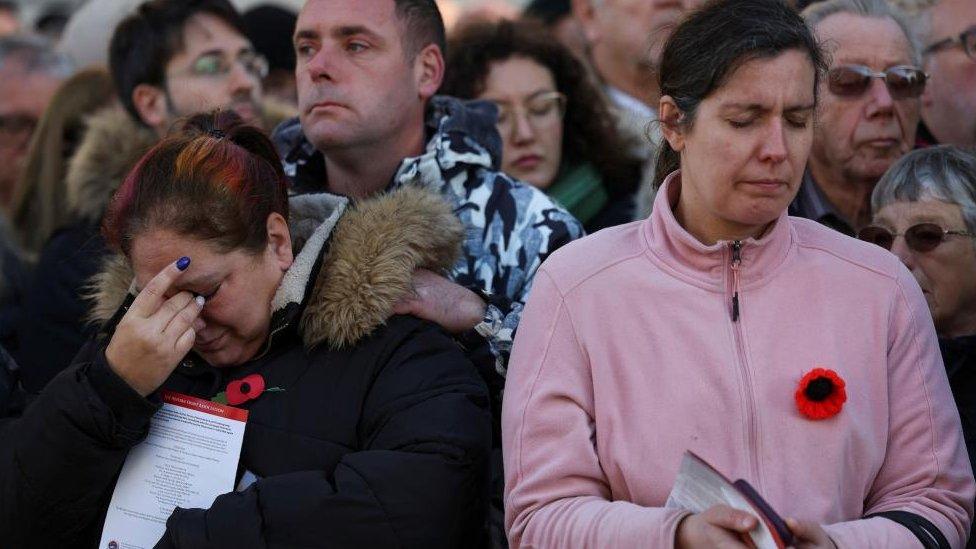
Hundreds of people gathered at London's Cenotaph to observe two minutes of silence at 11:00, commemorating the UK's war dead
The Met expects Saturday's pro-Palestinian demonstration to be the largest since weekly marches began in early October, and it is deploying nearly 2,000 officers across central London.
Police have warned the use of force is "likely", amid concerns around counter-marches by far-right groups.
The Palestine Solidarity Campaign, which has organised the march, has repeatedly stressed their route does not go past the Cenotaph, and has rejected appeals by the Met and politicians to postpone.
Demonstrators gathered at Hyde Park around noon, with the protest due to move from there to the US embassy in Vauxhall, and ending at 16:00 GMT.
The officer in charge of policing Saturday's protest, Deputy Assistant Commissioner Laurence Taylor, said the Met's job was to police "without fear or favour", balancing the rights of all.
He added it would be a "very difficult weekend" but the focus of officers was "to ensure that people are kept safe".
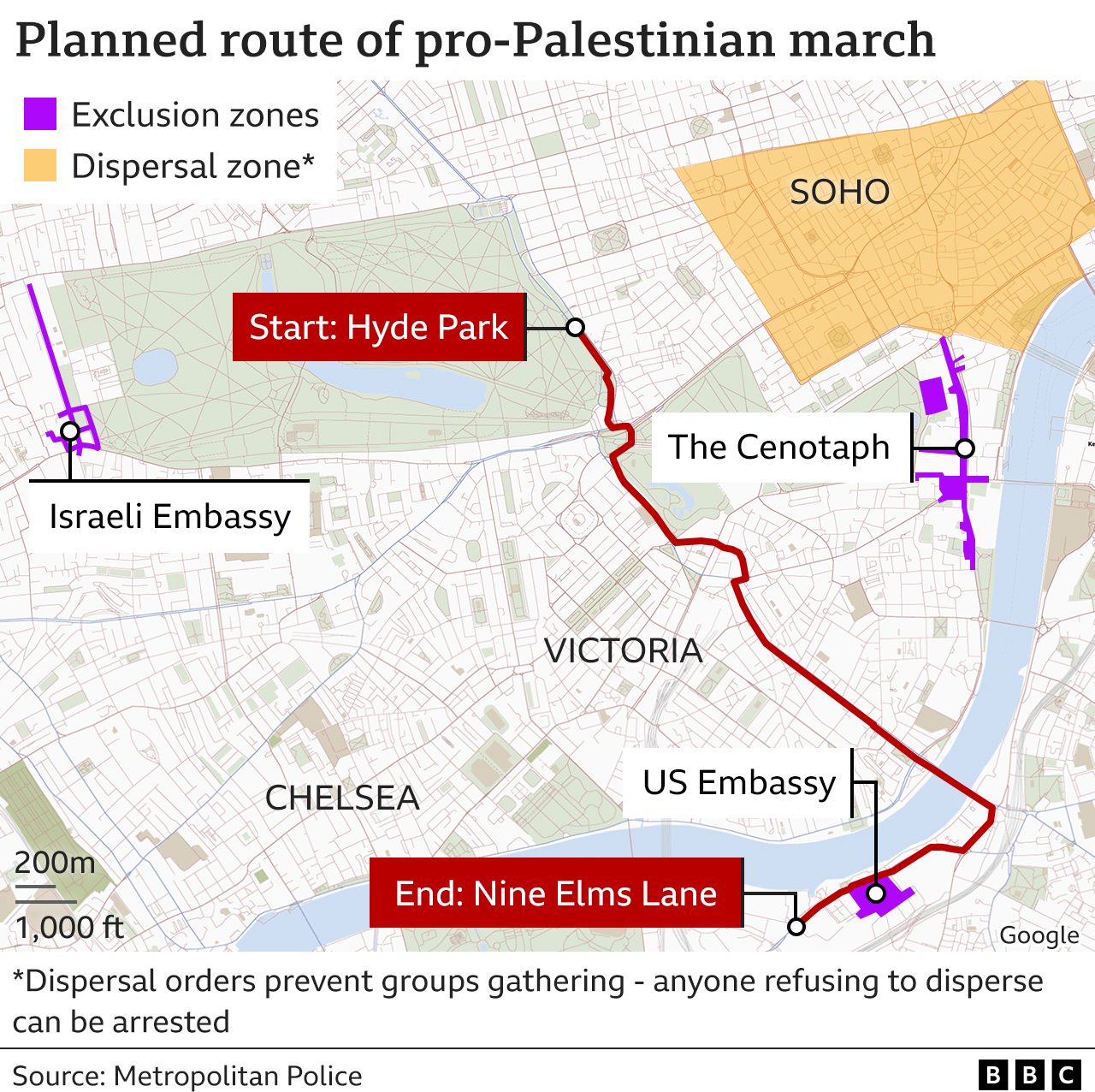
Other security measures announced by the Met include an exclusion zone using metal barriers around Whitehall and Parliament, and the US and Israeli embassies, as well as a 24-hour police guard at the Cenotaph.
A dispersal zone covers Trafalgar Square, and much of Soho and north Westminster to prevent impromptu gatherings. Police have also banned demonstrations at Waterloo, Charing Cross and Victoria train stations.
And there are plans to prevent a "convoy of cars" carrying pro-Palestinian protesters, which is expected to arrive from elsewhere in the UK, reaching Jewish communities.
No major protest is scheduled to take place on Remembrance Sunday, although the policing operation will continue with some 1,375 officers deployed amid commemoration events in the capital.
Met Commissioner Sir Mark Rowley said earlier this week the legal threshold which would allow him to ask the Home Office for permission to ban the march had not been met. He also stressed there are no powers in UK law to ban a static demonstration.
The Met said it had made 188 hate crime arrests since the conflict between Hamas and Israel erupted on 7 October.
A majority of the arrests were for suspected antisemitic offences.
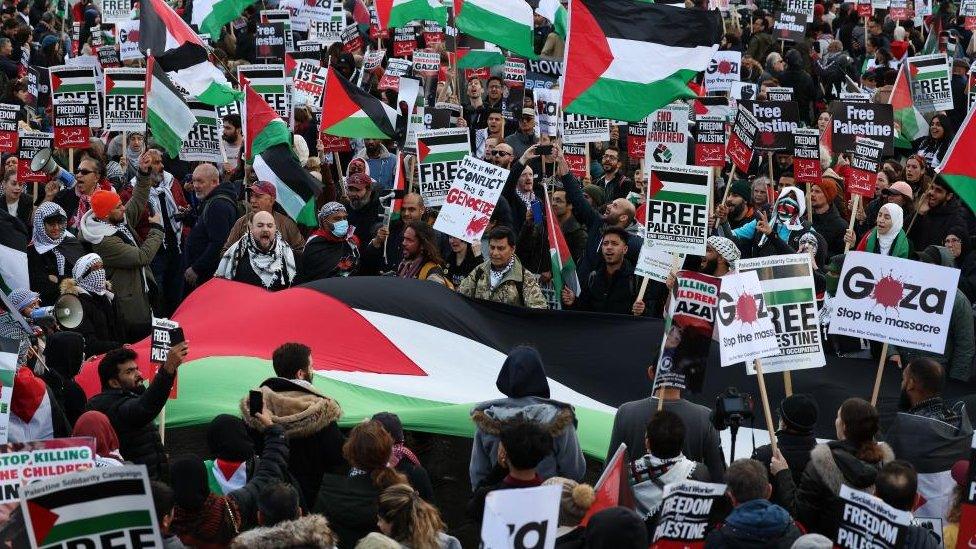
A previous pro-Palestinian protest in London
A political row over Home Secretary Suella Braverman's comments about the Met in the Times newspaper has dominated the week.
She claimed aggressive right-wing protesters were "rightly met with a stern response", while "pro-Palestinian mobs" were "largely ignored" - accusing the force of applying "double standards".
It later emerged she had defied a Downing Street request to tone the article down, including - according to the Times - a comparison between pro-Palestinian demonstrations and marches in Northern Ireland.
Critics of Mrs Braverman say she has undermined the police and potentially broken the ministerial code by not agreeing her remarks with No 10.
A source close to the home secretary said she had met with the Met commissioner on Friday, where she "emphasised her full backing for the police in what will be a complex and challenging situation and expressed confidence that any criminality will be dealt with robustly".
Steve Hartson, national chair of the Police Federation which represents rank and file officers, said it was "unacceptable" for a home secretary to "publicly attempt to tamper with the operational independence of policing".
Downing Street said the PM continued to have confidence in the home secretary, and was "still looking in to what happened with [Mrs Braverman's] op-ed".
Labour leader Sir Keir Starmer said Armistice Day should serve as a reminder "that peace is possible", even against a backdrop of bloodshed in Israel and Gaza.

Have you been affected by any issues raised here? You can share with us by emailing haveyoursay@bbc.co.uk, external.
Please include a contact number if you are willing to speak to a BBC journalist. You can also get in touch in the following ways:
WhatsApp: +44 7756 165803
Tweet: @BBC_HaveYourSay, external
Please read our terms & conditions and privacy policy
If you are reading this page and can't see the form you will need to visit the mobile version of the BBC website to submit your question or comment or you can email us at HaveYourSay@bbc.co.uk, external. Please include your name, age and location with any submission.
- Published9 November 2023
- Published10 November 2023
